Joy Neal Kidney's Blog, page 14
October 2, 2024
Unusual Connections
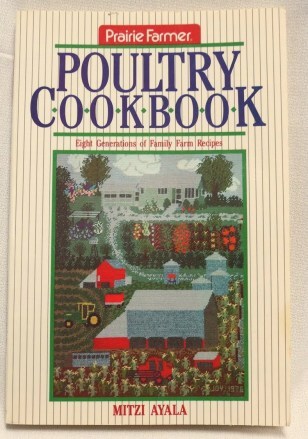 May I use your needlepoint farm on the cover of my new poultry cookbook?
May I use your needlepoint farm on the cover of my new poultry cookbook?
This was in 1985. The author, Mitzi Ayala, was a Harvard graduate and ricer grower from California, hostess of “Mitzi’s Country Magazine” TV program, speaker, columnist, and author of several Prairie Farmer cookbooks.
There’s not one chicken in my 1976 needlepoint farm, but her book was published by Wallace-Homestead Book Company, which had Iowa connections. I was credited for the “original needlepoint design.”
I don’t know how the author or publisher learned about the needlework farm back then, but the internet has enabled connections which would be impossible otherwise.
Lamb’s Ears Poem
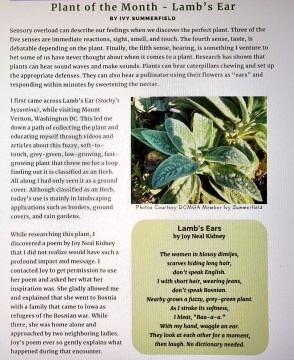 I’d forgotten about this until recently being asked by a garden newsletter editor in Texas if she could include one of my poems. She’d planned to feature a plant she’d come across while visiting Mount Vernon, and ran into my poem while googling Lamb’s Ears and wanted to know the backstory.
I’d forgotten about this until recently being asked by a garden newsletter editor in Texas if she could include one of my poems. She’d planned to feature a plant she’d come across while visiting Mount Vernon, and ran into my poem while googling Lamb’s Ears and wanted to know the backstory.
Ivy Summerfield’s delightful Plant of the Month story about Lamb’s Ears is in October 2024 issue of The Root, the Denton County Master Gardener Association publication, pages 7 and 8. (Please click on the link to access the entire handsome issue.)
I also learned a lot about this humble plant. And unexpected connections the internet makes possible.
October 1, 2024
Dad’s Prayer
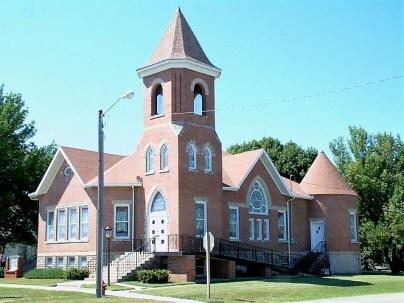 Our family was active in the Presbyterian Church, which is still standing along White Pole Road in Dexter, Iowa.
Our family was active in the Presbyterian Church, which is still standing along White Pole Road in Dexter, Iowa.
Dad’s family had been members–Kenneth and Ruby Neal. Kenneth’s folks, O.S. and Nellie Neal, also worshiped there, as had O.S.’s mother, Rhoda Neal. Her husband John (a Civil War veteran) may also have gone to church with her.
My Neal cousins also grew up in farm families near Dexter, so we went to school with them (until school reorganization in 1958), and also church.
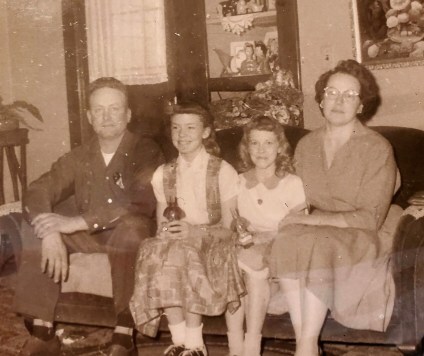 Dad would have taught that SS class not long after this was taken, one Christmas at Grandpa and Grandma Neal’s (Kenneth and Ruby). Dad, Joy, Gloria, Mom.
Dad would have taught that SS class not long after this was taken, one Christmas at Grandpa and Grandma Neal’s (Kenneth and Ruby). Dad, Joy, Gloria, Mom.When I posted something about my dad, I got feedback from hometown people who said they just loved having him as their Sunday School teacher when the were in junior high. He must have started teaching when I was in high school. I wish I’d been one of his students! He was a patient dad, with a sense of humor.
At home, his go-to prayer before we ate supper was, “Dear God, you have given us so much. Give us one thing more–a grateful heart. Amen.”
 The east window in the Dexter Presbyterian Church
The east window in the Dexter Presbyterian Church
September 29, 2024
September, a bittersweet month
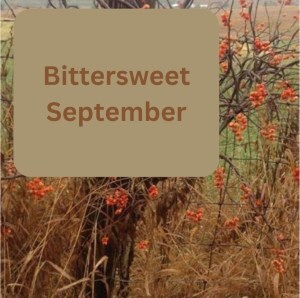 Bittersweet September
Bittersweet SeptemberI’ve been a little pouty about having to decline an invitation to give the keynote speech at an annual high school Veterans Day presentation, in a town connected to the Wilson family. Traveling has become difficult for both my Favorite Guy and me.
Then I remembered the blessings of this September, such as learning about the book club that has chosen Leora’s Early Years for their October meeting.
And Our American Stories aired my first new story, six years after the very first one.
The granddaughter of W. D. Clampitt found my story about him, and about Louise Oehlman, the retired teacher who took in her mother who’d been orphaned at age 14. She was so grateful to find the stories, and sent a photo of her parents’ wedding, with Miss Oehlman in it.
And the granddaughter of a man who owned one of the original Granger Homesteads sent a note, glad that I’d shared Brent Hegstrom’s blog post about them. Her grandfather’s house is still in the family!
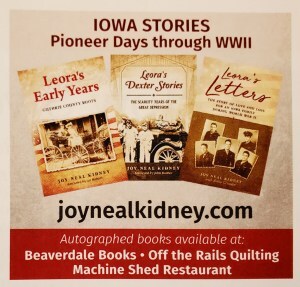 Mary Jo Bennett won the gift card to Beaverdale Books I offered along with my very first ad for the Leora books in Our Iowa Magazine, so I took a few more books to our indie bookstore, bought myself one, and the gift card to send Mary Jo. (My prize for the October/November issue is a gift card to Off the Rails Quilting, which also carries the Leora books.)
Mary Jo Bennett won the gift card to Beaverdale Books I offered along with my very first ad for the Leora books in Our Iowa Magazine, so I took a few more books to our indie bookstore, bought myself one, and the gift card to send Mary Jo. (My prize for the October/November issue is a gift card to Off the Rails Quilting, which also carries the Leora books.)
John Busbee’s interview with me about What Leora Never Knew was rerun on his Culture Buzz radio program. In it, the idea of motherline stories came up. I’m at work on those, so it was just the nudge I needed.
And I just discovered this welcome review on Amazon for What Leora Never Knew: “This story is a sweeping family quest. Joy Neal Kidney did an extensive family search for the real story behind the death of three of her uncles in World War Two. Five served. Only two made it home. What Leora Never Knew depicts the incomprehensible impact such a loss had on her family and the great resolve it gave the author to bring the story into the light. She did an exemplary job using actual letters as exhibits in the story. She has honored both those who were lost and those forced to endure such a loss. I am glad I read this account. It had to be told and the family legacy it spawned had to be honored. Joy is such a gifted storyteller. Every bit as good as the other books in the series.”
Blessings galore!
How great is the love the Father has lavished on us, that we should be called children of God! – 1 John 3:1
September 28, 2024
Gold Star Mothers: Lillie Archibald and Leora Wilson
I’d heard Grandma Leora talk about Lillie Archibald, but I only connected some dots to learn that they were more than just long-term friends.
Leora’s brother Jennings Goff married Tessie Sauvago. Lillie was her sister.
Lillie Sauvago married John Silverthorne, who died in 1922. They had two sons, John Sauvago Silverthorne, born in 1916, and Gordon P. Silverthorne, born in 1918.
So Lillie was widowed in 1922, with two small boys. Her sister Tessie died of mumps in 1924, four days after the birth of Merrill Goff.
Lillie remarried in 1925 to Clement Archibald. She lost her firstborn, John Silverthorne, in 1945. During World War II, Leora lost her three youngest sons.
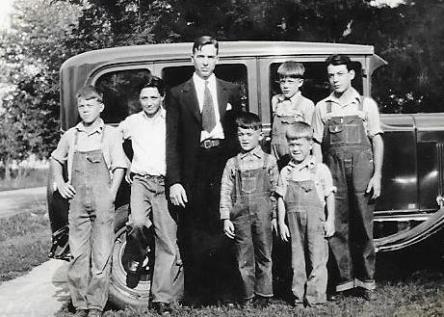 L-R: Donald Wilson (b. 1917). I think the next one is John Sauvago Silverthorne (b. 1916) the one lost during WWII. (His father had died in 1922 and his mother, Lillie Sauvago, was a sister of Tessie.) Lillie married Clement Archibald in 1925 to I believe that’s who the adult is (step-father of John Silverthorne), then Merrill Goff, Dale Wilson, Danny Wilson (front), and Delbert Wilson.
L-R: Donald Wilson (b. 1917). I think the next one is John Sauvago Silverthorne (b. 1916) the one lost during WWII. (His father had died in 1922 and his mother, Lillie Sauvago, was a sister of Tessie.) Lillie married Clement Archibald in 1925 to I believe that’s who the adult is (step-father of John Silverthorne), then Merrill Goff, Dale Wilson, Danny Wilson (front), and Delbert Wilson.This old photo finally makes sense. Mom mentioned the name Silverthorne and someone lost in WWII.
Maxine and Merrill Goff spent summers with their Sauvago grandparents at Wichita, Iowa. John Silverthorne was probably in Dexter to pick them up for the summer, or to return them to their Goff grandparents in time for school to begin again.So the photo was taken in Dexter, about 1929 or 1930.And to think that four of these boys would lose their lives between 1943 and 1945.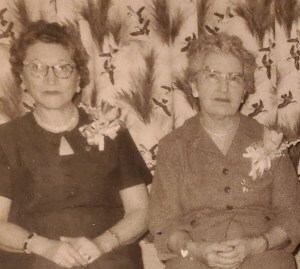 Lillie Sauvago Archibald and Leora Goff Wilson, Gold Star Mothers honored in Guthrie Center, Iowa, 1959.Gold Star Mother’s Day is the last Sunday each September.
Lillie Sauvago Archibald and Leora Goff Wilson, Gold Star Mothers honored in Guthrie Center, Iowa, 1959.Gold Star Mother’s Day is the last Sunday each September.
September 26, 2024
Those 90th Birthday Celebrations!
Three ladies in my motherline were blessed with celebrations for their 90th birthdays, although they chose different ways to mark their special occasions–one took her first plane trip, her oldest daughter enjoyed an open house, and the next one, also an oldest daughter asked for an excursion on a dinner train.
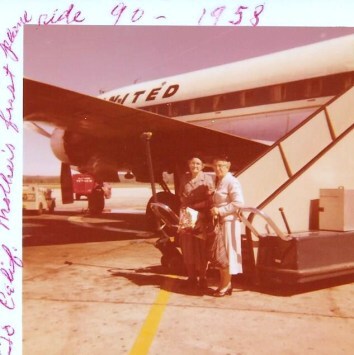 Laura Goff and her daughter Leora Wilson, September 1958
Laura Goff and her daughter Leora Wilson, September 1958Great Grandmother Laura Jordan Goff, took her first plane trip to California in 1958. Laura was born in a Guthrie County log cabin, September 28, 1868. She nurtured a family of ten children (plus another who lived only a year), moving dozens of times, traveling mostly by horse and buggy or by train. She’d already taken the train to California to spend time with some of her children and grandchildren. But when she turned 90, she flew there with her oldest daughter, Leora.
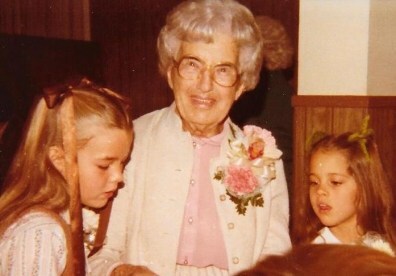 Leora Wilson with great granddaughters Deni and Christa Scar, 1980
Leora Wilson with great granddaughters Deni and Christa Scar, 1980My mother and her sister (Doris and Darlene) held an open house in1980 for their mother, Leora Goff Wilson, when she turned 90. Some of her great grandchildren were there to celebrate with the woman (born in Guthrie County, December 4, 1890) who had given birth to ten children, raised seven to adulthood, only to lose three during WWII. Later she’d made a home in Guthrie Center for her own mother for fourteen years.
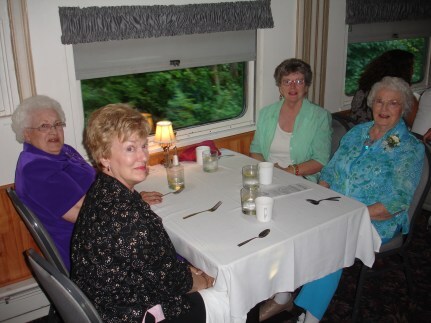 Darlene Scar, Gloria Neal, Joy Kidney, and Doris Neal, August 2008, on the dinner train. Guy and Dan Kidney were seated opposite our table.
Darlene Scar, Gloria Neal, Joy Kidney, and Doris Neal, August 2008, on the dinner train. Guy and Dan Kidney were seated opposite our table.Mom, Doris Wilson Neal, born in Guthrie County, August 30, 1918, didn’t want an open house. She asked to celebrate her 90th birthday with a ride on the Boone an Scenic Valley Dinner Train, so that’s what we did in August of 2008, including her sister Darlene and only grandchild, who traveled from the Twin Cities to attend.
If I’m blessed to live another ten years, I wonder what sort of celebration I’d enjoy. Maybe something with my only granddaughter, who will be 17 by then!
September 21, 2024
Our American Stories, a new one six years after the first one
During the summer, Montie Montgomery, who has produced nearly all of my little recordings, asked if I’d do a few more. I’d been wanting to do one about the care taken by graves registration teams to identify lost remains from WWII, including Danny Wilson.
It was first aired September 10, six years after the first one was carried by WHO-Radio in 2018. You may listen to it here. It lasts about 10 minutes, after 3 minutes of ads.
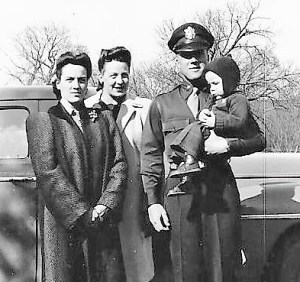 Photo mentioned in the story.
Photo mentioned in the story.Danny Wilson’s story is also told in Leora’s Letters and What Leora Never Knew, with his photo in the center of both book covers.
Here are others produced by Our American Stories with Lee Habeeb.
September 19, 2024
How can you reconcile tragic losses with a loving God?
Twenty years ago, Jerry Sittser lost his daughter, wife, and mother in a car accident. He chronicled that tragic experience in A Grace Disguised, a book that has become a classic on the topic of grief and loss.
Now he asks: How do we live meaningfully, even fruitfully, in this world and at the same time long for heaven? How do we respond to the paradox of being a new creature in Christ even though we don’t always feel or act like one? How can we trust God is involved in our story when our circumstances seem to say he isn’t?
While A Grace Disguised explored how the soul grows through loss, A Grace Revealed brings the story of Sittser’s family full circle, revealing God’s redeeming work in the midst of circumstances that could easily have destroyed them. As Sittser reminds us, our lives tell a good story after all. A Grace Revealed will helps us understand and trust that God is writing a beautiful story in our own lives.
A Grace Disguised: How the Soul Grows through Loss
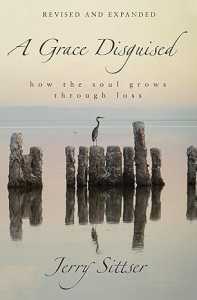 How does a human being, a survivor of a terrible accident, go on living without three family members (three generations) were killed in the same accident? Jerry Sittser was widowed and the father of three motherless children because of the crash. What happens to a man’s faith in God and how does he help his children through catastrophic losses when he doesn’t know how himself? Sittser describes how utterly bewildering life was for years, how he coped, grieved, managed to keep teaching and parenting, holding onto grace and hope at the same time. Incredibly helpful.
How does a human being, a survivor of a terrible accident, go on living without three family members (three generations) were killed in the same accident? Jerry Sittser was widowed and the father of three motherless children because of the crash. What happens to a man’s faith in God and how does he help his children through catastrophic losses when he doesn’t know how himself? Sittser describes how utterly bewildering life was for years, how he coped, grieved, managed to keep teaching and parenting, holding onto grace and hope at the same time. Incredibly helpful.
A Grace Revealed: How God Redeems the Story of Your Life
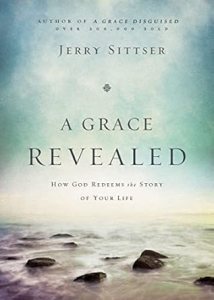 This thoughtful and hopeful book reminds us that even though we live through losses, sometimes enormous life-changing losses, our stories can be part of God’s overarching story of redemption.
This thoughtful and hopeful book reminds us that even though we live through losses, sometimes enormous life-changing losses, our stories can be part of God’s overarching story of redemption.
Jerry Sittser is a professor emeritus of theology and senior fellow in the Office of Church Engagement at Whitworth University. He holds a master of divinity degree from Fuller Theological Seminary and a doctorate in the history of Christianity from the University of Chicago. He is the author of several books, including A Grace Disguised and The Will of God as a Way of Life. Married to Patricia, he is the father of three children and two stepchildren, all grown, and nine grandchildren.
He also has other books, which you can discover here.
September 17, 2024
Kids and Fist Fights
My sister and I didn’t hear any discussions about getting into fights at school, probably because we didn’t have brothers. I was interested in the stories I heard about a couple of tussles including the Wilson brothers. The first one happened about 1926, when they’d just taken a new job as tenant farmers along Old Creamery Road in Madison County, Iowa. The Wilson youngsters began classes at the nearby country school.
 Delbert Wilson is on the left in the back row. The teacher is the woman with the dark hair, with Howard Davidson beside her. Penn #4 Schoolhouse, 1926
Delbert Wilson is on the left in the back row. The teacher is the woman with the dark hair, with Howard Davidson beside her. Penn #4 Schoolhouse, 1926Husky followed the five oldest as they hiked the gravel road to the rural school on the corner not half a mile south. Delbert and Donald were sixth graders at the Penn Township school. Doris was the only one in third grade, so the teacher had her join the fourth graders. Twins Dale and Darlene were first graders.
Delbert soon got into a fight with Howard Davidson, the biggest kid in the school. Delbert won. The boys became fast friends, all the way through high school at Dexter.
Clabe had told his boys that if they ever got in a fight, to make sure their thumb was on the outside when they made a fist. Hitting someone with the thumb inside the fist could easily dislocate the thumb.
During the 1930s middle brother Dale got into a fight with a bigger kid on the way home from school. Danny and Junior ran ahead to tell their mother. The high schoolers, Delbert and Donald, were already home.
“Donald, you go see what’s happening.” Leora paused, holding a dish towel. “Danny and Junior, you boys stay here. Donald, make sure it’s a fair fight.”
A bedraggled Dale came home with Donald. “Mom, it was a fair fight,” Don told her, “but the other boy’s shirt got torn. His mother is really mad. She even said, ‘Mrs. Wilson had better get over here or she’s liable to take a trip’.”
Leora laughed. “Well, it’s been a while since I’ve been on a trip!” She asked Dale if he was okay. He was, just roughed up a bit.
That episode got around the neighborhood. Next time neighbor Mr. Neal saw Leora, he called out, “Mrs. Wilson, I hear you’re gonna take a little trip!”
—–
What messages did you grow up with about getting into fights?
September 13, 2024
Questions to Ponder: Leora’s Dexter Stories: The Scarcity Years of the Great Depression
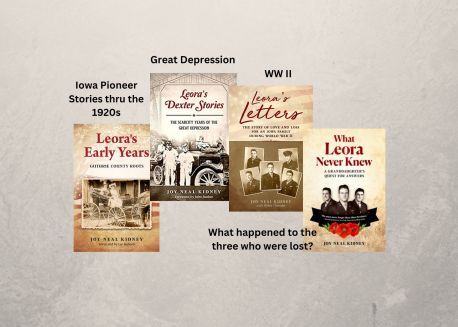
A couple of book clubs have read Leora’s Dexter Stories, then gather to discuss it. One club read all three Leora books and voted this one their favorite. Here are questions at the end of this book to help start conversation about those Great Depression days:
Questions to Ponder
1. Leora was blessed by having the support system of family, even her parents and adult siblings living nearby. At what points in the story does she have to let go of a family member? How do those losses affect her? What does that say about her character?
2. Marilynne Robinson, through a character in her book Gilead, says, “It is a good thing to know what it is to be poor, and a better thing if you can do it in company.” Do you agree that it’s a good thing to know what it is to be poor?
3. A character in Willa Cather’s My Antonia says, “But, you see, a body never knows what traits poverty might bring out in ‘em.” Having lived through the challenges of 2020 (Covid-19, hurricanes, a derecho storm in the Midwest, an especially contentious election), what traits have those brought out in you?
4. In Song of the Lark, Willa Cather says, “The fear of the tongue, that terror of little towns. . . . “ If you’ve lived in a small town, what are the drawbacks? What about the benefits?
5. “. . .[T]he depression that began in 1929. . . came on harder and faster, it engulfed a larger part of the population, it lasted much longer, and it did far more and far worse damage than any before it.”
In Brother, Can You Spare a Dime, Melton Meltzer said that no one can understand America today without knowing something about the Great Depression of the 1930s. Even the lives of those who suffered through it are different because of that disaster, he said. “The deepest wounds of the depression were borne by children.”
Do you have family stories that have come down from those Great Depression years?
6. I’ve heard that people tend to collect or even hoard the things they missed out on as children. My mother Doris couldn’t have enough towels and sheets in the linen closet. She also collected dolls. Can you relate to this?
7. There have been times in our history where world events create such an undertow that it affects individual lives. Besides the Great Depression and Covid-19, can you think of other events that have been turning points in your own life?
8. “The way I see it,” says Billie Jo in Karen Kesse’s Newbery Medal Winner Out of the Dust, (one sentence from poetic lines) “hard times aren’t only about money, or drought, or dust. Hard times are about losing spirit, and hope, and what happens when dreams dry up.”
Which do you think is harder: poverty of material things or poverty of spirit?
Leora’s Dexter Stories is also available as an audiobook, done with Virtual Voice. You may listen to a sample of it below the book cover.
September 11, 2024
Remembering 9/11/2001
The summer of 2001 had been miserable with strange all-over pain and exhaustion, with all sorts of tests to try to figure it out. The medical folks finally settled on fibromyalgia as my malady, with nothing they could offer for relief. (One did have me try an antidepressant, which made me feel worse, and getting off of it even caused troublesome side effects.)
I was on the computer the morning of September 11. Friend Jorja alerted me to turn on the TV, that something awful had happened.
 I watched in disbelief, with a heating pad wrapped around my side–shingles. I spent the rest of the morning glued to the TV in horror, a heating pad wrapped around my right ribs. My husband Guy, an air traffic controller, watched with me as the second tower was attacked. What a terrible day.
I watched in disbelief, with a heating pad wrapped around my side–shingles. I spent the rest of the morning glued to the TV in horror, a heating pad wrapped around my right ribs. My husband Guy, an air traffic controller, watched with me as the second tower was attacked. What a terrible day.
Guy did go to work, just in case. The only plane in the air was Air Force One, north of Des Moines that afternoon, heading back to the US Capitol.
The doctor had diagnosed my shingles, even before the blisters appeared. I argued that I wasn’t old enough (I was 56), but he insisted he’d treated high schoolers with it. The meds didn’t help much.
I’d been accompanying Zlatka to her prenatal exams, mainly to corral her two older children. I learned that I shouldn’t be around her until the blisters dried up, that the virus that caused shingles could harm her baby, which was due within a month. I’d planned to go through labor and delivery with her (as I had for her first baby born in America two years earlier).
The blisters were gone in time, but those other miseries were part of the day Zlatka’s new baby was born. I can always figure out how old Denis is because of having shingles during the terrorist attacks right before he was born in 2001.
It’s still hard to fathom those heinous terrorist attacks, that Denis is already grown up, and that I still deal with a miserable mysterious malady all these years later.



